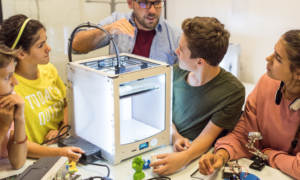 Literacy is a broad term that includes reading, writing, speaking and listening, as well as multiple literacies, such as media literacy, cultural literacy, and academic literacy. The process of language and literacy development helps children and youth define identities and supports the acquisition of academic, career and vocational skills and competencies.
Literacy is a broad term that includes reading, writing, speaking and listening, as well as multiple literacies, such as media literacy, cultural literacy, and academic literacy. The process of language and literacy development helps children and youth define identities and supports the acquisition of academic, career and vocational skills and competencies.
Language and literacy activities have been provided to children and youth in Out-of-School Time (OST) programs from their inception at the turn of the century. Robert Halpern (2003) conducted one of the first research studies on literacy in OST settings, Supporting the Literacy Development of Low-Income Children in Afterschool Programs: Challenges and Exemplary Practices. Halpern writes that afterschool programs can provide a “rich environment” for literacy development, and can incorporate “home and community culture.” He finds that “afterschool programs’ philosophy, purpose, and approach to nurturing literacy has to be different—in some ways fundamentally different—from that found in most…schools.”
This topic is divided into two categories:
Each category has several sections (see menu on right) with free resources to download which provide both researchers and practitioners a deeper understanding how OST programs can support language and literacy learning.
Latest News
- Q&A with Alex Lohrbach on the release of the Elevating Youth Engagement curriculum
- Q&A with Michael Crawford, America Succeeds
- Q&A: Why the former CEO of AmeriCorps is excited about heading an organization he had never heard of
- Competitive youth sports culture leads to burnout and quitting for many in U.S.
- Refocusing on youth development: Changes coming to Youth Today
- Juma Ventures helps “opportunity youth” earn, learn and launch careers
- Young children may go hungry as summer begins
- After outcry from tribes, federal agency scales back tribal school choice plan
- For some tribal communities, Head Start programs provide a cultural lifeline
- AmeriCorps’ work with students nationwide in limbo despite halt to federal funding cuts




















